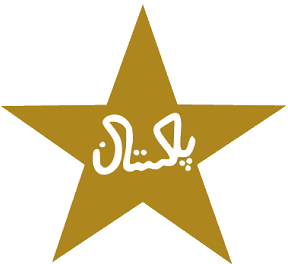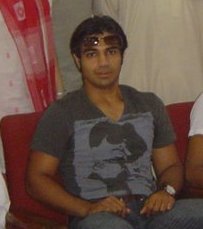
The International Cricket Council (ICC) is the global governing body of cricket. It was founded as the Imperial Cricket Conference in 1909 by representatives from Australia, England and South Africa. It was renamed as the International Cricket Conference in 1965, and took up its current name in 1987. The ICC has its headquarters in Dubai, United Arab Emirates.

Shoaib Akhtar is a Pakistani former cricketer and commentator. Nicknamed the "Rawalpindi Express", he was one of the fastest bowlers to have played the game. Akhtar made his Test match debut in November 1997 as an opening fast bowler and played his first One Day International three months later. He has been involved in several controversies during his career, often accused of unsportsmanlike conduct. Akhtar was sent home during a Test match series in Australia in 2005 for alleged poor attitude and a year later received a ban after testing positive for the performance-enhancing substance nandrolone. However, the ban imposed on him was lifted on appeal. In 2008, Akhtar was banned for five years for publicly criticising the Pakistan Cricket Board, although in October 2008, the Lahore High Court suspended the ban and Akhtar was selected in the 15-man squad for the Twenty20 Quadrangular Tournament in Canada. Akhtar retired from international cricket after the 2011 World Cup. Post-retirement, he began a YouTube career by starting his own channel, where he gives reviews on International and league matches and Pakistan cricket.

The Pakistan national cricket team or Pak cricket team, often referred to as the Shaheens, Green Shirts, Men in Green and Cornered Tigers is administered by the Pakistan Cricket Board (PCB). The team is a Full Member of the International Cricket Council, and participates in Test, One Day International (ODI) and Twenty20 International cricket matches.

Kamran Akmal is a Pakistani cricket administrator, coach and former cricketer, who played for Pakistan as a right-handed batsman & wicketkeeper. He started his international career in November 2002 with a Test match at Harare Sports Club.

Mohammad Asif is a Pakistani former cricketer who played for the Pakistani national cricket team between 2005 and 2010.

Mohammad Hafeez is a former Pakistani international cricketer. Hafeez was a versatile batsman who could bat anywhere in the top 6 and formed part of the bowling attack. He played as a spin bowling all-rounder for the majority of his career and, along with Saeed Ajmal and Shahid Afridi, formed part of one of the best spin attacks in the 2010's. Hafeez was a member of the Pakistan team that won the 2017 ICC Champions Trophy, and had a major role in the final, where he scored an unbeaten innings of 57. He retired from Test cricket after the third and final match against New Zealand in Abu Dhabi in December 2018, departing the ground for the final time in white clothing to a guard of honour from his teammates. On 3 January 2022, he announced his retirement from all forms of international cricket, ending a career that spanned more than 18 years.

Salman Butt is a former Pakistani cricketer and captain who played for Pakistan national cricket team between 2003 and 2010, before getting banned for five years for his involvement in 2010 spot-fixing scandal.
Mohammed Ijaz Butt is a former Pakistani cricketer who played in eight Test matches from 1959 to 1962. A wicket keeper and right-handed opening batsman, he scored 279 runs from his brief Test career at a modest batting average of 19.92, however he was a capable wicket keeper with a first-class cricket career for Lahore, Multan, Punjab and Rawalpindi where he scored 3,842 runs at 34.30 with a best of 161. For the next few decades, he worked as the director new projects at Service Industries Pakistan, expanding it to one of the largest manufacturer of footwear and motor cycle / cycle tyres and tubes. It is listed on the stock exchanges of Pakistan and has annual sales of Rs. 6 billion. As of 2016 he is a director on the board of Servis Tyres.
Cricket has had a number of controversies relating to players being involved with the betting aspects of the game. In particular, numerous players have been approached by bookmakers and bribed to throw matches, aspects of matches or provide other information.

Mohammad Amir is a Pakistani cricketer and bowler for the Pakistan national cricket team. He is a left-arm Medium-fast bowler and a left handed batsman.

Mohammad Shahzaib Hasan Khan, is a Pakistani cricketer who has been banned for four years, for his involvement in spot-fixing. Previously, he played domestic cricket for Karachi Zebras, making his debut with them in the 2008–09 season.
The 2010 international cricket season was between May and August 2010. The season included a spot-fixing scandal involving the Pakistan team that resulted in three Pakistani cricketers being banned by the International Cricket Council and given prison sentences.
The Pakistan cricket team toured England from 29 July to 22 September 2010. The tour consisted of four Tests, two Twenty20s (T20) and five One Day Internationals (ODIs). The first Test of the series, at Trent Bridge, was the 900th Test match to be played by England.
Mazhar Majeed is a British sporting agent and bookmaker who came under police investigation in 2010 following reports of cricket 'match fixing' after a News of the World sting operation. On Saturday 28 August 2010, he was arrested by Scotland Yard for allegedly fixing a Test match between England and Pakistan in Lord's. On 3 November 2011, Majeed was given a prison sentence of 32 months on convictions of "conspiracy to make corrupt payments" and "conspiracy to allow others to cheat at gambling," to run concurrently.
Spot-fixing is illegal activity in a sport in which a specific aspect of a game, unrelated to the final result but upon which a betting market exists, is fixed in an attempt to ensure a certain result in a proposition bet. Examples include something as minor as timing a no ball or wide delivery in cricket or timing the first throw-in or corner in association football.
Usman Sarwar is a former Pakistani cricketer. Sarwar was a right-handed batsman who bowled right-arm medium-fast. He was born at Lahore, Punjab.
The 2004–05 ABN-AMRO Twenty-20 Cup was the first edition of the ABN-AMRO Twenty-20 Cup, a domestic Twenty20 tournament in Pakistan. It was held from 25 to 30 April 2005 in Lahore. The Faisalabad Wolves won the tournament by defeating the Karachi Dolphins in the final. As the winners, the Faisalabad Wolves were invited to compete in the International 20:20 Club Championship in September 2005, which they won.
Rana Faheem Ashraf is a Pakistani international cricketer who represents the national side and plays first-class cricket for Habib Bank Limited. In August 2018, he was one of thirty-three players to be awarded a central contract for the 2018–19 season by the Pakistan Cricket Board (PCB).
Asif Ali is a Pakistani cricketer playing for the Pakistan national cricket team. In first-class cricket, Asif represents Northern, and he plays for Islamabad United in the Pakistan Super League.











